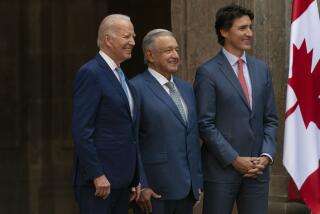Don’t Underestimate Happy-Talk Summit
- Share via
OXFORD, England — It is generally agreed that the Moscow summit was a success. True, no sweeping new measures of arms control were concluded, but no one expected that they would be and no one who knows anything about it believed that they should be. The intermediate-range nuclear-forces treaty is enough to be going on with, and when we see how that works out we can move on to the more ambitious objective of a strategic-arms-reduction treaty.
Paradoxically indeed, the better the relations between the superpowers, the less need there will be for arms-control treaties. A sensible agreement that some issues are just too difficult to resolve and are best left alone for a while is a better indicator of improved relations than a hurried and botched treaty or, worse, some vapid declaration of “common goals” into which each side will read exactly what it wants. Arms reductions will be more possible, if less necessary, as political relations improve. If they do not improve, negotiations will remain in the future what they have been in the past: the continuation of the Cold War by other means.
If the summit meeting was judged a success, therefore, it was because it was seen to improve relations not so much between the two states as between the two peoples. Americans can take justifiable pride and pleasure in their President’s consistency and forthrightness in preaching the Western doctrine of “human rights” in the heart of the Soviet empire. But of yet greater significance was the fact that his hosts permitted him to do so, gave his remarks full publicity and did not respond with denunciations of the same kind. And, most important of all, the Soviet peoples could see President Reagan for what he was: a kindly, well-meaning man, not terribly well-informed, a little sententious, but brimming over with good will--very different from the trigger-happy cowboy depicted in their media over so many years.
The Moscow summit thus complements the Washington summit of last fall, when the American people inspected Mikhail S. Gorbachev and realized that a society that could throw up a leader so articulate, intelligent and presentable was no longer the unchanging and unchangeable totalitarian monolith depicted in their media. If the Americans saw in Gorbachev the kind of person with whom they could do business, the Soviets have seen in Reagan the kind of man who will let them live in peace. And this may strengthen Gorbachev’s hand in persuading his military to begin demolishing the vast arsenals that, like a cancer, suck the strength out of the ailing Soviet economy.
Summits are all very well, but they have two drawbacks. First, there is nowhere to go from them but down. Second, there is standing room for two or three people only. Any summit will inevitably be followed by a sense of anticlimax, when exaggerated hopes are belied and it is discovered that the world has not been miraculously transformed overnight. The Western news media in particular, which are themselves largely responsible for raising impossible expectations, are the first to complain loudly that they have been misled. So, gentle readers, watch this space.
Further, questions understandably arise: What kind of a mandate did those leaders have at the summit? How truly representative were they of their societies? Can they make their agreements stick? Is Gorbachev more than the smooth, fast-talking salesman of an empire still unregenerately evil? Even if he is, can he in the long run prevail against the military, the KGB and the sluggish conservatism of the Soviet bureaucracy? On the other hand, is Reagan (or his successor) of any significance compared with the faceless multinational corporations whose wealth depends on the arms race, that manipulate the Pentagon and the CIA and that were able to insinuate Oliver L. North into the White House to conduct a foreign policy of which even the President was unaware?
Summits are of little use unless they can broaden out into plateaus--that is to say, a broad and continuous presence of interaction at every level. Leaders should certainly continue to meet at regular intervals so as to establish a kind of rapport that eliminates misunderstandings and enables them to cut through the tangles created by their bureaucrats--to “thump the table,” as Gorbachev put it. But a lot of other people must meet as well, and meet very much more frequently.
In the 20th Century--and even more, probably, in the 21st--peace depends on good relations, not simply between states but between the societies that they represent; indeed, the first is impossible without the second. No amount of summitry will avail unless the Soviet Union continues to evolve into the kind of society with which good relations are possible. This does not mean that it must become a pluralistic democracy on the Western model; we may indeed hope that it can find some less chaotic way to manage its affairs. But it does mean that information must circulate freely, that diverse views can be expressed without fear of punishment and that archaic and paranoid habits of secrecy, mendacity and espionage must be, however slowly, abandoned by its rulers. The Soviet Union, like its czarist predecessor, has been an empire not so much of evil as of darkness. Let us hope for and encourage the increase and broadening of the light.
More to Read
Sign up for Essential California
The most important California stories and recommendations in your inbox every morning.
You may occasionally receive promotional content from the Los Angeles Times.










